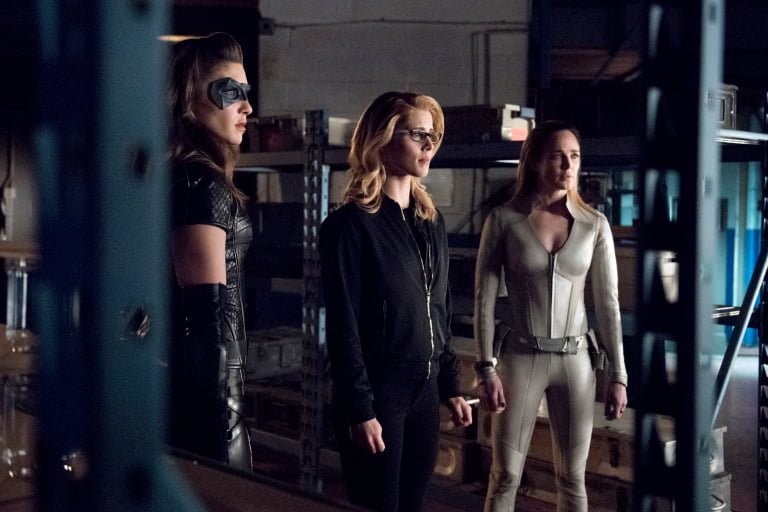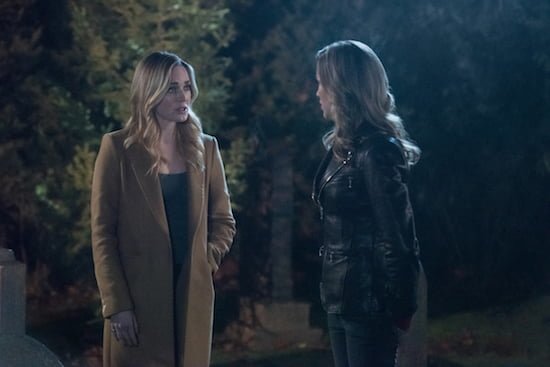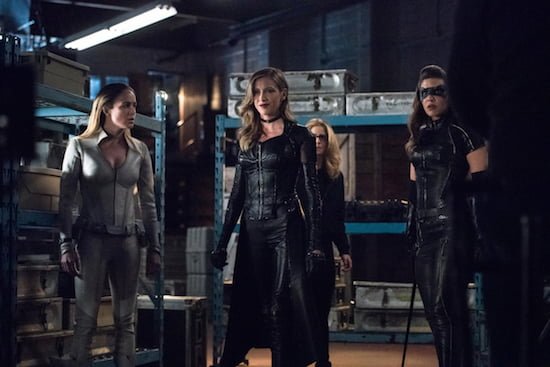
One of the biggest issues with network shows is that they often have to speed through narrative arcs that would be stronger and more impactful if given more time to develop. “Lost Canary” is a perfect example of this as it gives us a Laurel who, after being framed for murder, is on the run and almost immediately reverts back to her criminal ways. But whereas some may write her off, Felicity is the one person that refuses to give up on her. Though sloppily executed, the overall message rings true, not just for Laurel but for the future Mia, who realizes that there is strength in knowing that others have your back.

It’s not a new thing to have a villain-turned-hero stumble a few times in his or her journey in becoming a new person. We saw this early on with Laurel’s character and her incomprehensible rise as untrained yet highly effective DA. In the year or so since she’s taken that post, she’s fought the urge to cut corners or, at times, blatantly break the law to get the job done. That in itself is not a bad thing; the struggle in becoming something you’re not is a hard road and those moments where Laurel nearly backslid were a testament to her trying to live up to Quentin’s belief in her.
The problem in this short two-arc story, however, is how easily she succumbs to some people losing faith in her. Yes, it would be disheartening to experience but it’s as if she doesn’t even acknowledge that Felicity — the closest she has to a true friend — never loses faith. Felicity is eventually able to steer Laurel back to the light, but the fallout from the Black Siren’s brief flirtation with her darker side is quickly swept under the rug.

And therein lies the issue with “Lost Canary”. It’s a hastily put-together script that doesn’t give us time to truly appreciate the magnitude of Laurel’s actions, both good and bad. Despite her partnership with Shadow Thief (a very cool new character) targeting bad guys, there are no real consequences to Laurel murdering them alongside her temporary partner.
When she switches allegiances after a good old face-to-face with Felicity during that final act, it’s so sudden that it loses any real emotional weight. Had this particular story arc been seeded through the last three or four episodes with “Lost Canary” being the culmination to that lead-up, it would have been a much greater impact. Instead, it was almost like a generic and deeply flawed PSA of “don’t worry if you do wrong but then do right kids, we’ll forgive you and you won’t have to pay for your crimes”. The one saving grace in that is Laurel realizes she does indeed have to make up for her actions, deciding to return to Earth-2. Whether that’s to balance the scales by being a hero or literally accept punishment for her crimes remains up in the air, but as the flash forward shows us, whatever she does has completely solidified her as a true white hat.
On the flash forward, like the present time, the women are center stage. We get to understand a bit more about Dinah and her creation of the Black Canary network and its purpose as a support structure for the strong women out there fighting for the city. The message itself is a solid and necessary one — both for women and people as a whole: you’re never as alone as you think you are and when you realize that, you’re more powerful than you can imagine. The stumble is more about the overall execution of Laurel’s story than the nature of the message. So much seems like it’s wrapped up in a bow, skimming the surface of what has been a surprisingly captivating character.
In the end, while Arrow does a bit of a disservice to the complex nature of Laurel’s situation and subsequent choices, the overall theme still shows out and, even if it’s a bit muddled, reminds us there are people out there that will battle through Hell to stand tall with us. And mistakes or not, that’s a potent reminder that we are never alone.
Nota Bene
- This could have been one of those highlight moments of the season had we been given a more robust narrative that spanned several episodes instead of the one. Though the sisterhood message seems forced at times — much of it due to the rushed nature of the script — in the end, we are left with the question does help make up for the story’s shortcomings as a whole? The fact that future Laurel may have reached the stubborn Mia when everyone else failed strengthens that throughline that even the most recalcitrant of people can be reached.
- I’m not a fan of Sara Lance being the leader in Legends of Tomorrow, but her guest appearance in Arrow put the former assassin in her element. Though not wholly a loner, she does her best (and most believable) work not as a leader, but as that wild card with the autonomy to get it done her way. Subtle it may be, it makes a big difference to how effective she is on-screen.
- Despite the show being about him, Oliver took a backseat this week and that was okay. In truth, I appreciate when the titular character is sometimes pushed to the side for the supporting cast to have the spotlight. His mission with Diggle that has them capturing the Longbow Hunter Kodiak in their attempts to discredit the Ninth Circle and hopefully turn Emiko back from her dark path will be a vital part in the last few weeks of the season. Too bad Ollie doesn’t realize that she’s the one running the show.
